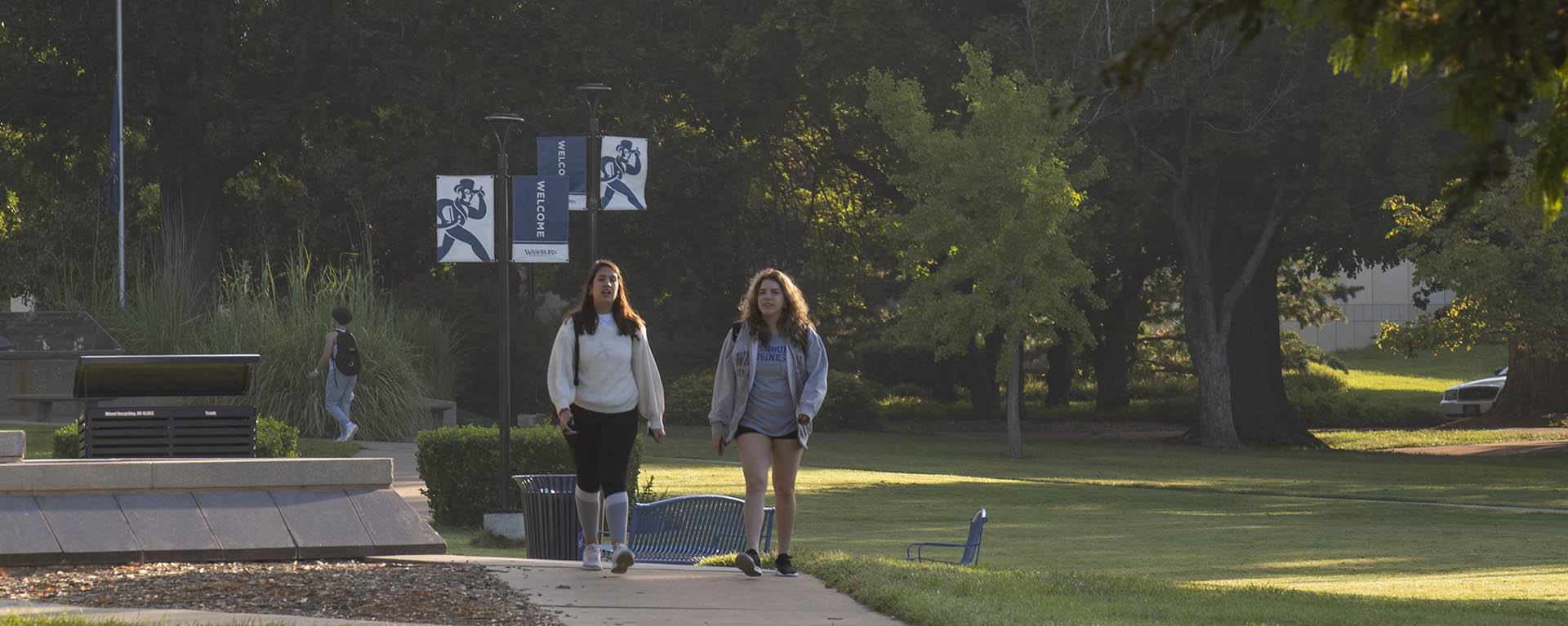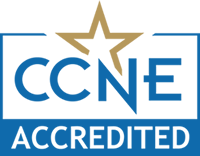
School of Nursing
Our Mission
Washburn University Harmony Hines School of Nursing mission is to prepare professional nurse leaders to provide quality healthcare to everyone.
History
The baccalaureate nursing program was established at Washburn University in the Fall of 1974. In 1982, the program was granted status as a School of Nursing through an act of the Legislature.

The baccalaureate degree program in nursing, Doctor of Nursing Practice program, and post-graduate APRN certificate program at Washburn University are accredited by the Commission on Collegiate Nursing Education, (http://www.ccneaccreditation.org).
All graduate APRN Programs are approved by the Kansas State Board of Nursing.
To continue to provide nursing education that addresses the future healthcare needs of the communities served by the School of Nursing, an Advisory Council was created in 2000. Advisory Council Members are asked to serve a minimum two year term and attend an annual meeting to review and provide input on the strategic direction of the School of Nursing.
Harmony J. Hines School of Nursing Advisory Board
- Adam Meier / Patricia Handley
- adam.meier@kutopeka.com / patricia.handley@kutopeka.com
- Chief Nursing Officer, University of KS Health St. Francis Campus
- Topeka, KS
- Trey George
- tgeorge@tha.gov
- President/CEO, Topeka Housing Authority
- Topeka, KS
- Kerri Moore
- kemoore@valeotopeka.org
- Director of Medical Services, Valeo Behavioral Health
- Topeka, KS
- Mindy Olberding
- mindyolberding@chcsks.org
- Chief Nursing Officer, Community Healthcare
- Onaga, KS
- Marsha Kent
- mkent@midlandcc.org
- Vice president of Clinical Services, Midland Hospice
- Topeka, KS
- Amy Kincade / Salena Gillam
- amy.kincade@stormontvail.org / SGillam@stormontvail.org
- Senior Vice President and Chief Nursing Officer / Vice President and Assistant Chief Nursing Officer, Stormont Vail HealthCare
- Topeka, KS
- Carrie Lutz
- carrie.saia@rhrjc.org
- Chief Executive Officer, Holton Hospital
- Holton, KS
- Annette Conrow / Natalie Zamulinski
- annette.conrow@ascension.org / natalie.zamulinski@ascension.org
- Vice President of Nursing & Operations, Ascension-Via Christi
- Manhattan, KS
- Crystal Stevens
- crystal.stevens@washburn.edu
- Interim Dean, Washburn University
- Topeka, KS
- Jan Wiebe
- jan.wiebe@lmh.org
- VP of Nursing, Lawrence Memorial Hospital
- Lawrence, KS
- Brie Cantrell
- bacantrell@cmh.edu
- Nursing School Clinical Senior Manager, MOKAN/Children's Mercy
- Kansas City, KS
- Stephanie Gfeller
- stephanie@leadingagekansas.org
- Director of Professional Development & Leadership, Leading Age Kansas
- Topeka, KS
Pre-licensure BSN Program
RN-BSN Program
PMHNP Program
Doctor of Nursing Practice (DNP) Program
NCLEX First-Time Pass Rates
| Pass Rate | 2017 | 2018 | 2019 | 2020 | 2021 | 2022 | 2023 | 2024 |
|---|---|---|---|---|---|---|---|---|
| Washburn University Pass Rate | 85.38 | 90.70 | 89.78 | 86.89 | 83.22 | 79.72 | 91.55 | 97.5 |
| Kansas Pass Rate | 82.10 | 88.90 | 86.60 | 86.18 | 84.58 | 81.54 | 92.53 | 92.26 |
| National Pass Rate | 87.11 | 88.29 | 88.18 | 86.57 | 82.48 | 79.90 | 88.56 | 91.16 |
Data is taken from the Kansas State Board of Nursing Annual Reports.
*Data to come.
FNP First-Time Pass Rates
| Pass Rate | 2019 | 2020 | 2021 | 2022 | 2023 | 2024 |
|---|---|---|---|---|---|---|
| Washburn University Pass Rate | 82 | 92 | 100 | 82 | 71 | 93 |
| National Pass Rate | 82 | 89 | 91 | 75 | 73 | 84 |
Data is taken from the American Academy of Nurse Practitioners Certification Board
The School of Nursing strategic goals for 2020-2023
- Goal #1: Promote student success through implementation and evaluation of innovative learning environments and adaptive teaching strategies
- Teaching Agility
- Clinical Agility
- Goal #2: Promote student competencies to enable students to care for patients in a dynamic, complex environment with a deeper understanding of the various factors affecting the human condition
- Human Factors
- Ethics (w/ application to contemporary issues)
- Communication
- Clinical Reasoning
- Competency-based Education Model
- Goal #3: Expand faculty and program impact through engagement (teaching, scholarship, service) with the larger community
- Faculty Development
- Scholarship (Scientific Inquiry, Teaching, Practice, Community Engagement)
- Serving Community
- Goal #4: Promote sound fiscal decisions utilizing new and existing resources to maintain the mission of the School of Nursing
- Maintain current level of Federal grant funding
- Review all SON programs
- Strategically market the undergraduate and graduate nursing programs
The nursing faculty believe each human being is a unitary, living open system and is continually engaged in a mutual dynamic process with the environment. Individuals are unique, have inherent worth, and strive to maintain system integrity while progressing through the life process from conception through death. Individuals, families, and communities, are open systems engaged in mutual dynamic process with the environment.
Nursing is a health profession which is concerned with promoting the quality of life in individuals, families, and communities. The deliberative and creative use of knowledge for the betterment of human beings is expressed in the science and art of nursing. The nurse, at all levels of preparation, is responsible for assisting the client in recognizing and coping with health needs throughout the life process. Through application of the nursing process, the nurse functions as a provider of care, a designer/ coordinator/manager of care, and as a member of the profession.
Nursing is a practice profession that values clinical expertise and the application of scientific knowledge. Professional education in nursing begins at the baccalaureate level. The purpose of professional nursing education is to provide the knowledge, skills, and attitudes necessary for the student to become a professional nurse and to have the foundation for graduate education. General education in the humanities and in the natural and social sciences provides a broad foundation for understanding and augmenting nursing theory and facilitates the development and integration of the nursing student as a professional person.
The student who attains a graduate degree in nursing becomes a specialized practice expert who demonstrates expanded accountability and responsibility for the care of patients, populations, and systems. In addition to the direct practice role, the graduate also demonstrates expertise in the following competencies:
- Scientific underpinnings for practice,
- Organizational and systems leadership for quality improvement and systems thinking,
- Clinical scholarship and analytical methods for evidence-based practice,
- Information systems/technology for the improvement and transformation of health care,
- Health care policy for advocacy in health care,
- Interpersonal collaboration for improving patient and population health outcomes,
- Prevention of disease and promotion of population health, and
- Advancing nursing practice
Learning is a complex, mutual process of growth and development identified by changes in the behavior of the learner. Each student is unique in life experiences, motivation for learning, and scholastic aptitude. The educational process is designed to provide opportunities for students to meet individual learning needs. The role of the nurse educator is to facilitate the learning process. Students are responsible for learning.
The philosophy and purposes of the School of Nursing are consistent with the mission of Washburn University. The School of Nursing is a major academic unit within the University and is responsible for determining its own professional curriculum and instruction. The richness of resources within the university and community provide opportunities for faculty and students to make significant contributions to health care delivery in a changing, multicultural society.
GET IN TOUCH WITH School of Nursing
School of Nursing
Petro Allied Health Center
1700 SW College Ave.
Topeka, KS 66621-1117
Phone & Fax
785.670.1525
Fax: 785.670.1032

